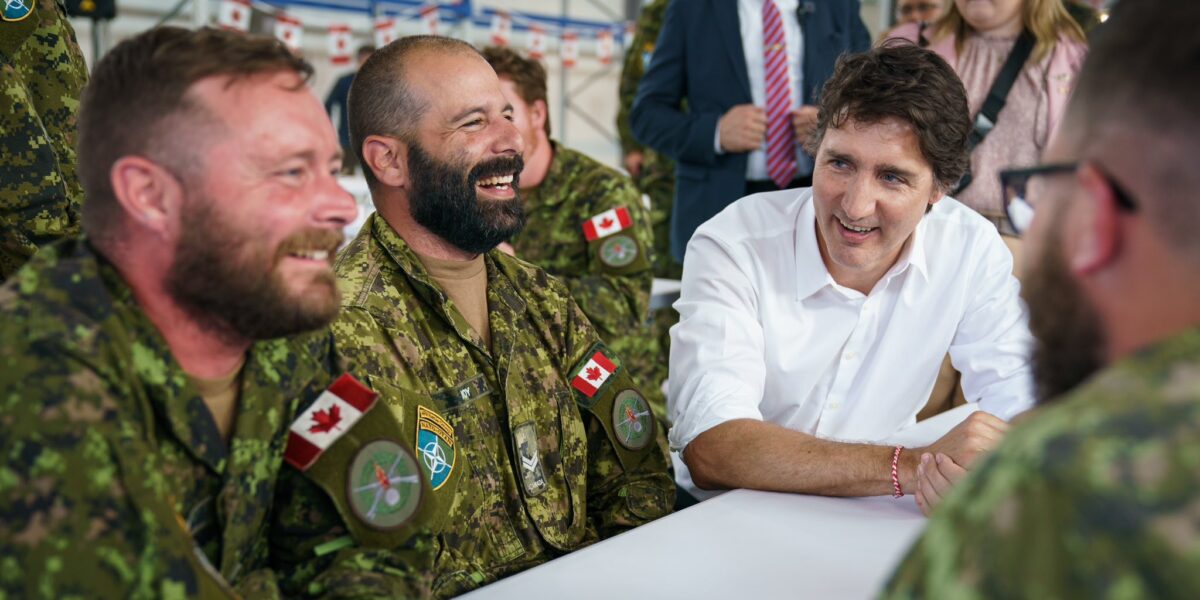Prime Minister Justin Trudeau has announced Canada will be committing $2.6 billion over the next three years to increase NATO presence in Latvia by 1,200 military personnel. The move will bring the total Canadian military personnel in the country to 2,200 by 2026.
“This is the way forward in modern defense,” Trudeau said in Latvia on Monday. “One thing we always say in Canada is ‘diversity is a source of strength. This battle group here in Camp Ādaži is proof of that, and the work we’re doing is incredibly valuable to NATO’s future.”
Trudeau explicitly framed his announcement as a response to “the Kremlin’s aggression” in the ongoing Russia-Ukraine War.
Since February 2022, Canada has provided over $8 billion in aid to Ukraine, including over $1.5 billion in military assistance.
In April 2023, Trudeau announced additional military aid to Ukraine, which included 21,000 assault rifles, 38 machine guns and over 2.4 million rounds of ammunition. In June he announced another $500 million in weapons and fighter pilot training.
A sign that the war is far from over
“This is basically an expectation that there will be no peaceful resolution of this war in Ukraine,” said Ivan Katchanovski, professor of political studies at University of Ottawa. He researches conflicts and political studies focusing on Ukraine.
While the military effect of Canada’s commitment in Latvia would not be immediately significant, Katchanovski said, it has potential to grow much bigger if the war in Ukraine continues, especially considering Latvia’s proximity to Russia and its ally Belarus.
Yves Engler, anti-war activist, says the announcement is “further escalation,” and “the opposite of what’s needed, which is both sides to back off.”
Engler said while Canada’s arms contributions are important to continuing the war effort, the more important role of Canada was training the Ukrainian military, in what the government calls Operation Unifier. The program, which began in 2015, has used Canadian Forces to train Ukrainian military personnel. Engler said this can be seen as in opposition to the Minsk II agreement pushed by France and Germany in the UN at the time of its implementation.
“So the expansion of troops into Latvia and expanding Canadian training of Ukrainian forces in Latvia is a really important part of Canada’s contribution,” Engler said.
This increase in Canadian military personnel to Latvia is the latest in heightened NATO activity surrounding the Russia-Ukraine war. In June, 250 aircraft conducted war games over German skies, with over 10,000 soldiers in what amounted to the biggest exercise in NATO history.
A PR move
Engler, also noted the announcement functions as public relations and works to protect Trudeau and the Liberals from criticism that they aren’t doing enough to support Ukraine.
The Prime Minister’s announcement comes after criticism has been lobbed at Canada for only spending 1.39 per cent of their GDP on NATO military commitments, rather than the expected level of 2 per cent. Yves Giroux, the Parliamentary Budget Officer, estimated in 2022 that in order to reach this goal, the federal government would need to increase spending by $75.3 billion dollars by the end of 2027.
However, an independent review done by Le Devoir in February calculated Canada’s military commitments to Ukraine to be around $2.26 billion, about $1.25 billion higher than the official numbers given by the Canadian government. Engler stressed he has not delved into each figure personally, but noted Le Devoir’s analysis was “as credible as any that I’ve seen.”
Last year, the Canadian Forces confirmed it was not keeping track of arms shipments to Ukraine. The European Agency for Law Enforcement Cooperation admitted in April of 2022 that weapons were already being trafficked to organized crime groups.
Political hypocrisy
During the Monday conference, Trudeau stated the increased Canadian military presence would work “to serve and defend democracy and the rule of law.”
But Katchanovski said this justification is “basically used to support policies which would not be acceptable in Canada itself.”
READ MORE: Why war in Ukraine isn’t about defending democracy
He noted that the Ukrainian government has banned opposition parties, TV channels, and has attempted to ban a branch of the Orthodox church in Ukraine, all on the basis of their affiliations with Russia.
Katchanovski said that justifications of Ukrainian sovereignty were also hollow, referring to the moves by UK and US representatives to halt a peace negotiation deal in April of 2022, mentioned by then-Israeli Prime Minister Naftali Bennett and reported by Foreign Affairs.
Katchanovski said that Trudeau’s move serves to justify military spending in Canada, which rarely has incentive to do so due to a reliance on US military protections. But, he said it also signals a shift in military support policies for Ukraine.
“Another issue is that a lot of military support for Ukraine, including weapons which were provided by Canada, US and other NATO members, actually depleted,” Katchanovski said.



